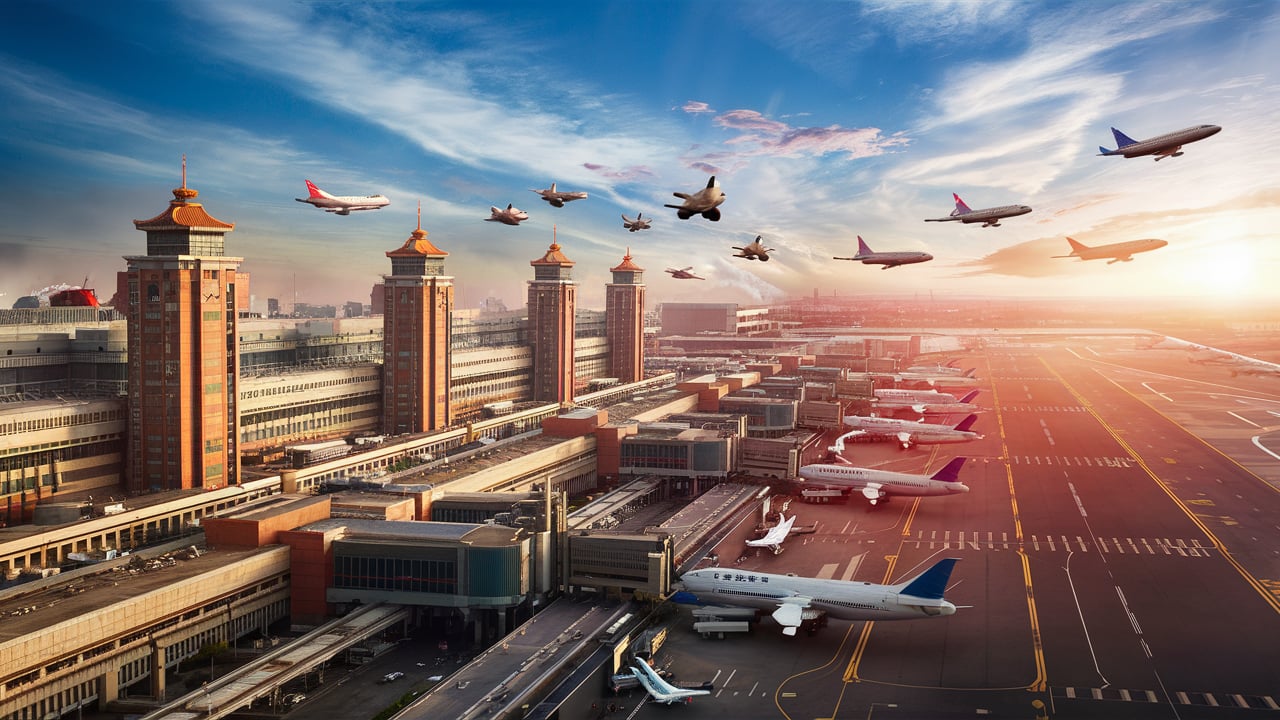Beijing Capital International Airport: Your Essential Guide to China’s Hub
Beijing Capital International Airport, known as PEK, is one of the busiest and most important airports in the world. As the primary gateway to China’s capital, it serves millions of passengers each year, playing a crucial role in international travel and commerce.
This blog post offers a detailed look at Beijing Capital International Airport, covering its history, facilities, transportation options, and more.
Whether you’re planning a trip to Beijing or just curious about this massive hub, this guide will provide you with all the information you need.
History of Beijing Capital International Airport
Beijing Capital International Airport opened in 1958, marking the beginning of a new era in China’s aviation history. Initially, it was a modest facility, handling a few domestic flights. However, as China’s economy grew and Beijing became a major global city, the airport expanded rapidly.
In 1980, the first international terminal was constructed, allowing Beijing Capital International Airport to accommodate more international traffic. The airport underwent several expansions over the years, including the addition of Terminal 2 in 1999 and the construction of the massive Terminal 3 in 2008, just in time for the Beijing Olympic Games. Terminal 3, designed by renowned architect Norman Foster, is one of the largest airport terminals in the world, symbolizing China’s rapid modernization.
Today, Beijing Capital International Airport is the second busiest airport in the world by passenger numbers, serving over 100 million passengers annually. It is a major hub for Air China and offers connections to over 120 destinations worldwide.
Terminals and Layout
Beijing Capital International Airport is divided into three main terminals: Terminal 1, Terminal 2, and Terminal 3. Each terminal caters to different airlines and offers a variety of services to passengers.
Terminal 1:
The smallest of the three, Terminal 1 is primarily used by domestic flights operated by Hainan Airlines and its subsidiaries. It’s well-equipped with basic amenities, including restaurants, shops, and lounges, making it convenient for travelers on domestic routes.
Terminal 2:
Terminal 2 handles both domestic and international flights, with a wide range of airlines using this terminal. It’s larger than Terminal 1 and offers a more extensive array of services, including duty-free shops, VIP lounges, and more diverse dining options. Terminal 2 is also connected to the Airport Express line, making it easy to reach from central Beijing.
Terminal 3:
Terminal 3 is the crown jewel of Beijing Capital International Airport. It’s one of the largest airport terminals in the world, covering an area of 986,000 square meters. Terminal 3 is divided into three sections: T3A, T3B, and T3C. T3A is the main check-in area, T3B is for domestic flights, and T3C handles international flights. The terminal boasts a wide range of facilities, from luxury shopping and fine dining to relaxation areas and art exhibits. It also has state-of-the-art security and immigration facilities, ensuring a smooth experience for travelers.
The layout of Beijing Capital International Airport is designed to handle a large number of passengers efficiently. The terminals are connected by shuttle buses, and clear signage is available in multiple languages, including English, to guide travelers through the airport.
Airlines and Destinations
Beijing Capital International Airport serves as a hub for numerous airlines, offering connections to destinations across the globe. It is the primary hub for Air China, the national carrier, which operates flights to over 120 domestic and international destinations from this airport.
Domestic Flights:
Beijing Capital International Airport connects Beijing with major cities across China, including Shanghai, Guangzhou, Chengdu, Shenzhen, and Xi’an. These domestic flights are essential for both business and leisure travelers, offering convenient access to China’s vast and diverse regions.
International Flights:
The airport offers direct flights to major cities in Asia, Europe, North America, and beyond. Some of the busiest international routes include flights to New York, London, Paris, Tokyo, and Seoul. Airlines such as Lufthansa, British Airways, Delta, and Japan Airlines operate regular flights to and from Beijing Capital International Airport.
Cargo Operations:
In addition to passenger flights, Beijing Capital International Airport is a major hub for cargo operations. It handles a significant portion of China’s air freight, with dedicated cargo facilities and services that cater to the needs of global trade.
The wide range of airlines and destinations served by Beijing Capital International Airport makes it a key player in global aviation, connecting Beijing with the world.
Facilities and Services
Beijing Capital International Airport offers a comprehensive range of facilities and services to meet the needs of travelers. Whether you’re looking for a place to relax, grab a bite to eat, or shop for last-minute gifts, the airport has something for everyone.
Shopping:
The airport is home to a variety of shops, ranging from luxury brands like Gucci and Prada to local souvenir stores. Duty-free shopping is available in all three terminals, offering travelers the chance to purchase perfumes, cosmetics, electronics, and more at tax-free prices. Terminal 3, in particular, is known for its extensive shopping options, with a wide range of international and local brands.
Dining:
Dining options at Beijing Capital International Airport cater to all tastes and preferences. From fast food outlets like McDonald’s and KFC to fine dining restaurants offering Chinese, Japanese, and Western cuisine, there’s something for everyone. Terminal 3 has some of the best dining options, with several high-end restaurants and cafes offering a relaxing atmosphere for travelers.
Lounges:
For those seeking a bit of luxury, the airport offers several VIP lounges in all three terminals. These lounges provide a quiet space to relax, with comfortable seating, complimentary snacks and beverages, Wi-Fi, and even shower facilities. Some lounges are accessible to passengers with specific airline memberships or credit cards, while others can be accessed by purchasing a day pass.
Accommodation:
If you have a long layover or an early morning flight, you might want to consider staying at one of the hotels near the airport. The Beijing Airport Hilton and the Cordis Beijing Capital Airport are two popular options, offering comfortable accommodations just minutes from the terminals. These hotels also provide shuttle services to and from the airport.
Health and Wellness:
Beijing Capital International Airport also takes care of travelers’ health and wellness needs. There are medical clinics available in all terminals, offering services for minor illnesses and injuries. For those looking to relax, there are massage services and spa facilities, particularly in Terminal 3.
Business Services:
Business travelers will find a range of services to help them stay connected and productive. Wi-Fi is available throughout the airport, and there are business centers offering printing, faxing, and other office services. Meeting rooms are also available for rent, providing a convenient space for business discussions.
Transportation to and from the Airport
Getting to and from Beijing Capital International Airport is easy, thanks to the various transportation options available. Whether you prefer public transport or private vehicles, there’s a method to suit every traveler’s needs.
Airport Express Line:
The Airport Express Line is a convenient and affordable option for travelers heading to or from the airport. This dedicated subway line connects the airport with central Beijing, including stops at Dongzhimen and Sanyuanqiao stations. The journey from the airport to the city center takes approximately 20-30 minutes, making it one of the fastest ways to travel.
Taxis:
Taxis are readily available at all terminals, offering a door-to-door service for travelers. The taxi stands are well-organized, with English-speaking staff available to assist foreign passengers. The fare from the airport to central Beijing typically ranges from CNY 100 to CNY 150, depending on traffic conditions and the exact destination. It’s worth noting that Beijing traffic can be heavy, especially during peak hours, so it’s wise to allow extra time for your journey.
Buses:
Several airport bus routes connect Beijing Capital International Airport with different parts of the city. These buses are an economical option, with tickets costing around CNY 25 per person. The buses are comfortable and have ample space for luggage, making them a good choice for budget-conscious travelers.
Car Rentals:
For those who prefer the freedom of driving themselves, car rental services are available at the airport. Several international and local car rental companies have desks in the arrivals halls, offering a range of vehicles to suit different needs. It’s important to note that driving in Beijing can be challenging due to heavy traffic and local driving customs, so it may not be the best option for everyone.
Private Transfers:
If you’re looking for a more comfortable and hassle-free experience, private transfer services are available. These services offer a range of vehicles, from standard sedans to luxury cars, with professional drivers who will meet you at the airport and take you directly to your destination. This option is ideal for travelers with a lot of luggage or those who prefer a more personalized service.
Tips for Travelers
Navigating Beijing Capital International Airport can be overwhelming, especially for first-time visitors. Here are some tips to help you make the most of your experience:
1. Arrive Early:
Given the size of the airport and the large number of passengers it handles, it’s a good idea to arrive at least two to three hours before your flight, especially for international departures. This will give you plenty of time to check in, go through security, and explore the airport’s facilities.
2. Use the Airport’s Mobile App:
Beijing Capital International Airport has a mobile app that provides real-time information on flight schedules, gate changes, and other important updates. The app also includes a map of the airport, helping you navigate your way through the terminals.
3. Be Prepared for Security Checks:
Security at Beijing Capital International Airport is thorough, so be prepared for detailed checks. Ensure that your liquids are within the allowed limits and that you don’t have any prohibited items in your luggage. It’s also advisable to wear shoes that are easy to remove, as you may be asked to take them off during the screening process.
4. Take Advantage of the Lounges:
If you have a long layover or need some quiet time before your flight, consider using one of the airport’s lounges. They offer comfortable seating, free Wi-Fi, and complimentary food and beverages, providing a welcome break from the busy terminal.
5. Currency Exchange:
If you need to exchange currency, there are several currency exchange counters and ATMs located throughout the airport. However, the rates may not be as favorable as those in the city, so it’s a good idea to exchange money before you arrive at the airport if possible.
6. Stay Connected:
Wi-Fi is available throughout Beijing Capital International Airport, but you may need to register with your passport number to access it. Make sure to have a fully charged phone and portable charger, as finding power outlets can sometimes be a challenge in busy areas of the airport.
7. Plan for Transportation:
Consider your transportation options to and from the airport ahead of time. The Airport Express Line is a fast and affordable option, but if you’re traveling with a lot of luggage or during peak hours, a taxi or private transfer might be more convenient.
Future Developments
As Beijing continues to grow as a global city, Beijing Capital International Airport is also planning for the future. Several development projects are underway to expand the airport’s capacity and improve its facilities.
New Runways:
To accommodate the increasing number of flights, the airport is planning to add new runways in the coming years. These runways will help reduce congestion and improve the efficiency of flight operations, ensuring that the airport can continue to handle a growing number of passengers.
Terminal Upgrades:
There are also plans to upgrade the existing terminals, particularly Terminal 2, to enhance the passenger experience. These upgrades will include modernizing the facilities, adding more shopping and dining options, and improving the overall comfort and convenience for travelers.
Sustainability Initiatives:
Beijing Capital International Airport is also focusing on sustainability, with plans to reduce its carbon footprint and improve energy efficiency. These initiatives include the use of renewable energy sources, waste reduction programs, and efforts to conserve water and other resources.
Integration with Daxing Airport:
With the opening of Beijing Daxing International Airport in 2019, there has been increased focus on integrating the operations of the two airports. This includes improving transportation links between the two airports and coordinating flight schedules to provide a seamless travel experience for passengers.
These future developments will ensure that Beijing Capital International Airport remains a world-class aviation hub, capable of meeting the needs of travelers for years to come.
Conclusion
Beijing Capital International Airport is more than just a gateway to China’s capital; it’s a symbol of the country’s rapid modernization and global significance. From its rich history and state-of-the-art facilities to its extensive network of airlines and destinations, the airport plays a crucial role in connecting Beijing with the world.
Whether you’re traveling for business or leisure, Beijing Capital International Airport offers a wide range of services and amenities to make your journey as comfortable and convenient as possible. With future developments on the horizon, the airport is set to continue its growth and maintain its status as one of the world’s leading aviation hubs.
We hope this guide has provided you with valuable insights into Beijing Capital International Airport. If you have any experiences, tips, or questions about the airport, we’d love to hear from you! Please leave a comment below and share your thoughts.



























Leave a Reply